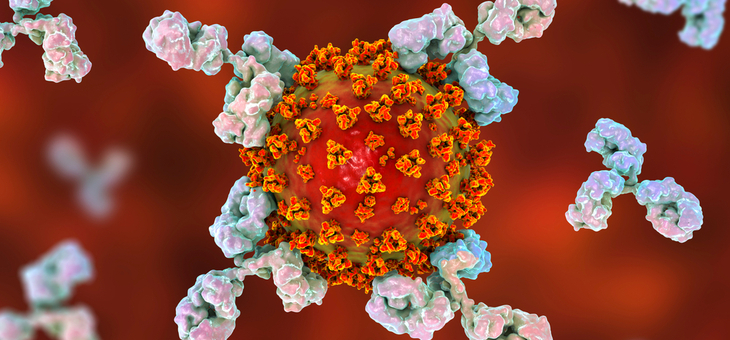Monoclonal antibodies could prove a game changer for COVID-19 prevention after a trial found they reduced the risk of coronavirus transmission by 81 per cent.
A monoclonal antibody ‘cocktail’, made by Regeneron, the company that provided former president Donald Trump’s treatment last year, was tested on people who had shared the same household as someone who tested positive for the coronavirus within the prior four days.
“These findings are very encouraging and suggest that REGEN-COV is highly effective at preventing symptomatic COVID-19 in household contacts of SARS-CoV-2 infected individuals,” said Dr Dan H. Barouch, co-principal investigator of the trial and director of the Center for Virology and Vaccine Research at Beth Israel Deaconess Medical Center.
The drug is intended for use by people not yet infected but exposed to people with infections.
Healthline explains that monoclonal antibodies are “manufactured antibodies very much like those the human immune system would make after a viral infection”.
Joan Kapusnik-Uner, vice-president of clinical content at First Databank, says combining more than one type of monoclonal antibody increases the chance that a coronavirus infection will be prevented from worsening.
They are also effective against new variants of the virus.
The New York Times reports that antibody drugs could give doctors “a new way to protect high-risk people who haven’t been inoculated or who may not respond well to vaccination, such as those taking drugs that weaken their immune system”.
“That could be an important tool as rising coronavirus cases and dangerous virus variants threaten to outpace vaccinations.”
Regeneron is seeking to have the drug’s authorisation expanded so it can be used for preventative purposes in “appropriate populations”.
Two previous antibody trials “reduced the chances of hospitalisation or death among participants by 85 per cent”, nature.com reports.
“The body’s natural response to viral infection is to generate a variety of antibodies, some of which are able to directly interfere with the virus’s ability to replicate. In the early days of the pandemic, researchers raced to identify the antibodies that are most effective against the coronavirus and to produce them in bulk. The resulting ‘monoclonal antibodies’ have since been tested in a variety of settings as treatments for COVID-19.”
Jens Lundgren, an infectious disease physician at the University of Copenhagen and Rigshospitalet, said: “It is not a replacement for vaccines, but it is a plan B.”
Read more: Sleep maximises benefits of COVID vaccine
Meanwhile, ABC News reports that a Brisbane biotech company has created an anti-inflammatory drug that is being trialled as a potential treatment for severely ill COVID-19 patients in the United States.
The new drug, also an antibody, could become part of routine care in serious cases to prevent people dying from the virus.
Research leader Professor Ian Frazer says IC14 controls severe and damaging inflammation, common to COVID-19 patients, but it could potentially be applied for any disease that causes “severe long-lasting inflammation”.
“It switches off one part of the immune pathway which causes trouble rather than benefit … anywhere where chronic damage is produced by inflammation.”
He said the drug would be given to patients who have “a serious chance of dying without this treatment”.
And in the UK, researchers from the University of Oxford have found that budesonide, a cheap, widely available inhalable asthma drug shortens the duration of COVID-19 symptoms by three days.
Read more: COVID vaccine available to over-70s
How do monoclonal antibodies work?
The body’s immune system generates antibodies as a defence mechanism against unfamiliar molecules. The scientific term for such unfamiliar molecules is antigens. Molecules from bacteria and viruses can act as antigens, prompting the production of antibodies.
Antibodies bind to antigens. This tells specialised cells of the immune system to kill the invading pathogen.
The bodies of most people who recover from COVID-19 produce antibodies to the SARS-CoV-2 virus. Scientists have found that these antibodies persist for at least five to seven months after the infection.
However, scientists can also produce these antibodies in a laboratory setting to be infused into the blood.
Monoclonal antibodies are identical copies of an antibody that targets one specific antigen. Scientists can make monoclonal antibodies by exposing white blood cells to a particular antigen.
Do you need an alternative to vaccines because of a weakened immune system? Do you think the pandemic will lead to medical advances we can all use afterwards?
Read more: Four things researchers still want to learn
If you enjoy our content, don’t keep it to yourself. Share our free eNews with your friends and encourage them to sign up.

